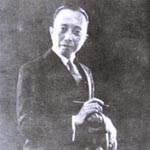- Li Jinhui
Infobox Chinese-language singer and actor
name = Li Jinhui

imagesize = 150px
caption =
chinesename =
tradchinesename = 黎錦輝
simpchinesename = 黎锦辉
pinyinchinesename = Lí Jǐnhuī
jyutpingchinesename = lai4 gam2 fai1
birthname =
ancestry =
origin = Qing China
birthdate = 1891
birthplace =Xiangtan ,China
deathdate = 1967
deathplace =China
restingplace =
restingplacecoordinates =
othername =
occupation = Producer,Composer ,Songwriter
genre =Shidaiqu ,Mandopop
instrument =Guqin
voicetype =
label =
yearsactive =
currentmembers =
pastmembers =
associatedact =
spouse =
partner =
children =
parents =
influences =
influenced =
website =
hongkongfilmwards =
goldenbauhiniaawards =
hkfcsawards =
goldenhorseawards =
goldenroosterawards =
ntsawards =
awards =Li Jinhui was a composer and songwriter born in
Xiangtan ,China in 1891. He is the "Father of Chinese popular music" [Baranovitch, Nimrod. [2003] (2003). China's New Voices: Popular Music, Ethnicity, Gender and Politics, 1978-1997. University of California Press. ISBN 0520234502] Aigomusic. " [http://cn.aigomusic.com/subject/oldsh/index.html Aigomusic] ." "Shanghai introduction." Retrieved on2007-04-30 .] . He is most notable for creating a new musical form withshidaiqu after the fall of theQing Dynasty -- moving away from established musical forms.Early years
One of the earliest instrument he studied was the
guqin plucked string instrument s during his childhood. He mainly drew his earliest musical influences from hishunan province hometown. He was inspired by localChinese opera andHuagu flower drums (zh-stp|s=花鼓戏|t=花鼓戲|p=huāgǔxì) which are performed over a stage theatre monologueAigomusic. " [http://cn.aigomusic.com/newspage/21577.ftl Aigomusic] ." "Li Jinhui." Retrieved on2007-04-30 .] . Because of this, it can be said that the very first inspiration of Chinese popular music are derived from these forms.From 1916 to 1926 he was participating in mandarin textbook publishing for children. He wrote his first musical, and allowed his daughter Li Minghui (zh-stp|s=黎明晖|t=黎明暉|p=Lí Mínghuī) to perform. In total he has 8 brothersChinabook gov. " [http://chinabook.gapp.gov.cn/O/Article.aspx?ArtID=051065&CateID=P2703 Chinabook] ." "Era of change." Retrieved on
2007-04-30 .] . Some of the operas include "The Sparrow and the Child" and "The Little Painter".Career
In 1927 he organized the "Chinese Dance School" (zh-stp|s=中华歌舞学校|t=中華歌舞學校|p=Zhōnghuá gēwǔ xuéxiào) and then the "Chinese Song and Dance Troupe" (zh-stp|s=中华歌舞团|t=中華歌舞團|p=Zhōnghuá gēwǔtuán).
His greatest source of
Jazz influence would come from AmericanBuck Clayton who worked with Li for two yearsJones. Andrew F. [2001] (2001). Yellow Music - CL: Media Culture and Colonial Modernity in the Chinese Jazz Age. Duke University Press. ISBN 0822326949] . Clayton played a major role in shaping the musical scores written by Li.In 1929 he organized the
Bright Moonlight Song and Dance Troupe and toured around the country. The tour began mostly as political squeeze due to theNational Revolutionary Army during the Northern Expedition. When he was situated atSingapore , that was when his "period song" compositions began. The style would have some western influence and it moved Chinese music to a new direction. Those period songs would then be labeled asshidaiqu .In 1931 it merged into the China Film Company. This troupe also produced several musicals figures such as
Zhou Xuan , who was groomed until Li's masteryBroughton, Simon. Ellingham, Mark. Trillo, Richard. [2000] (2000) World Music: The Rough Guide. Rough Guides Publishing Company. ISBN 1858286360] . She would later become one of theSeven great singing stars of theRepublic of China .In 1949 he was a composer for the
Shanghai Animation Film Studio . Li would eventually pay dearly for his fame. Classified as a founder ofYellow Music by theCommunist Party of China , he became a victim of political persecution during theCultural Revolution .Legacy
In his life time, critics derided his work as "
Yellow Music " because of its sexual associations. His work was labeled pornographic and was accepted only by select groups. His music movement would later grow into thecantopop andmandopop phenomenon, which became the main genre of music inHong Kong andTaiwan respectively in the 20th century.ee also
*
Roman Tam
*Cui Jian References
External links
* [http://64.233.167.104/search?q=cache:btbY54fda2AJ:www.ias.berkeley.edu/orias/2006/Jones.pdf+%22ORIAS:+Chinese+Popular+Music+in+the+Twentieth+Century%22&hl=en&gl=us&ct=clnk&cd=1 Orias: Sonic Histories]
* [http://www.humanchorus.org/archive.html?year=2003 Human Chorus under "Yellow Music part 2"]
* [http://home.seechina.com.cn/html/music/3gzcz-e.html See China]
Wikimedia Foundation. 2010.
